Leadership and Management Theories in Healthcare for Post Pandemic Service Provision
VerifiedAdded on 2023/06/10
|11
|3876
|379
AI Summary
This essay discusses the evaluation and application of leadership and management theories in healthcare for post pandemic service provision. It also covers critical understandings about current contemporary issues of healthcare and their associated organisation in leadership and management, ways where information and data analysis can show impact on leadership and management, and principles and practices of leadership and management in leading and managing change.
Contribute Materials
Your contribution can guide someone’s learning journey. Share your
documents today.
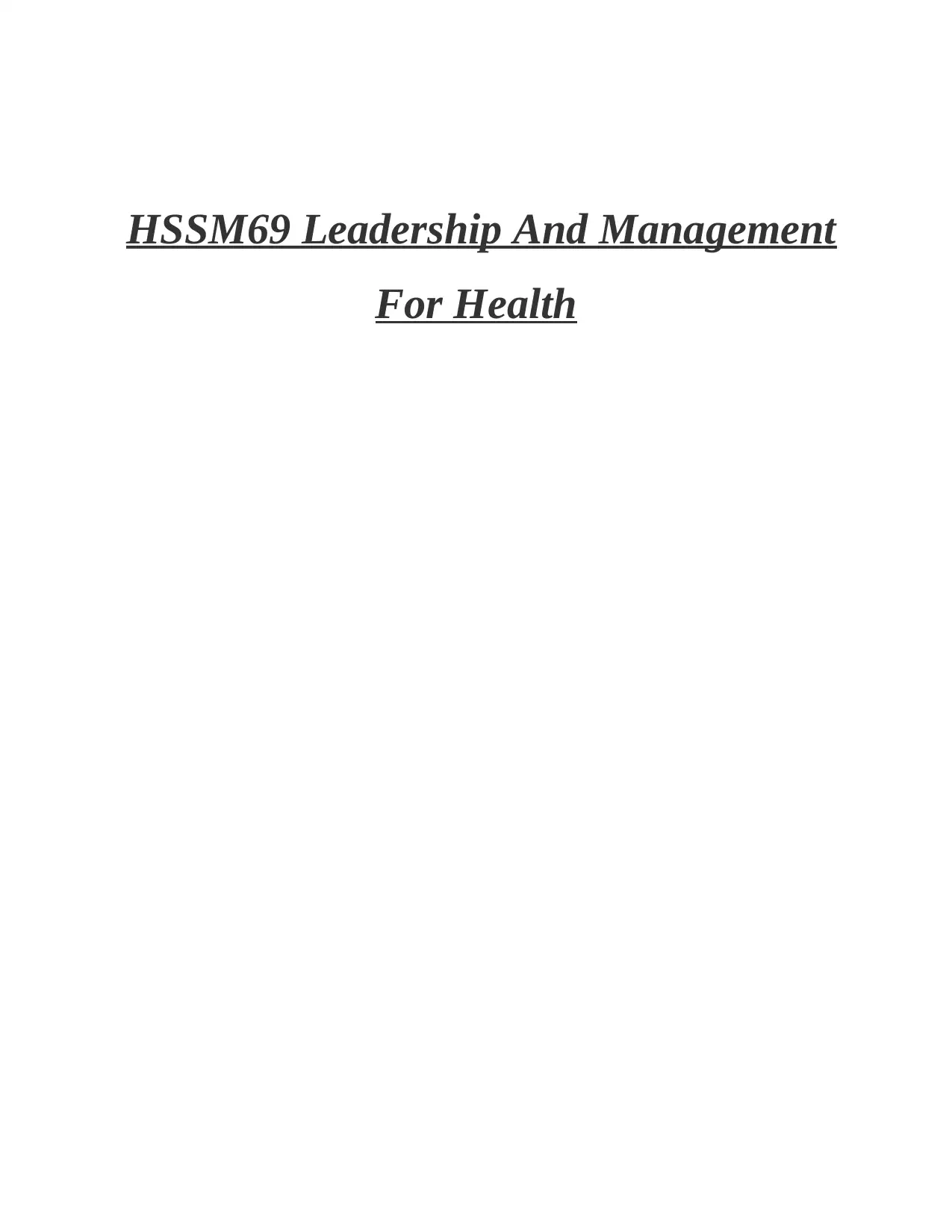
HSSM69 Leadership And Management
For Health
For Health
Secure Best Marks with AI Grader
Need help grading? Try our AI Grader for instant feedback on your assignments.
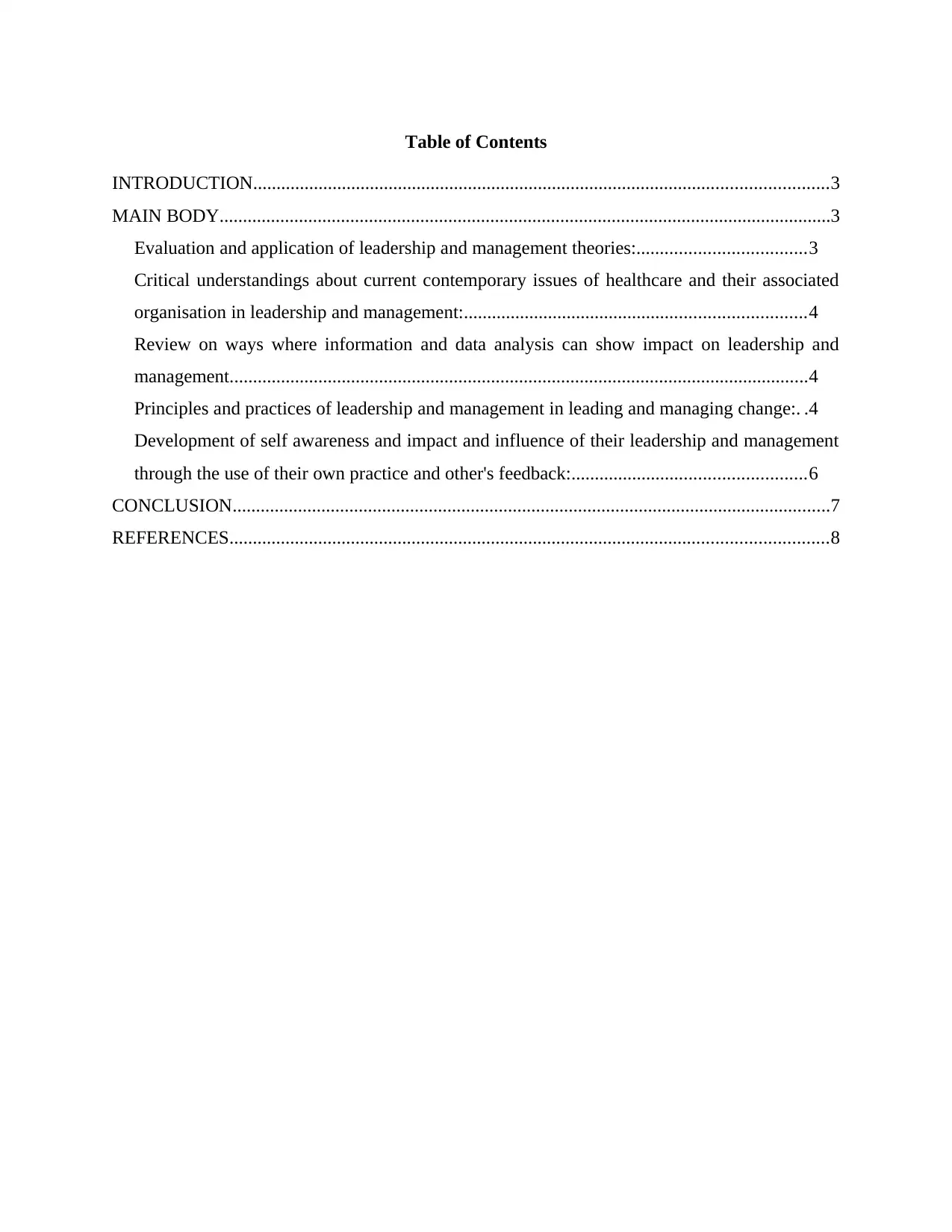
Table of Contents
INTRODUCTION...........................................................................................................................3
MAIN BODY...................................................................................................................................3
Evaluation and application of leadership and management theories:....................................3
Critical understandings about current contemporary issues of healthcare and their associated
organisation in leadership and management:.........................................................................4
Review on ways where information and data analysis can show impact on leadership and
management............................................................................................................................4
Principles and practices of leadership and management in leading and managing change:. .4
Development of self awareness and impact and influence of their leadership and management
through the use of their own practice and other's feedback:..................................................6
CONCLUSION................................................................................................................................7
REFERENCES................................................................................................................................8
INTRODUCTION...........................................................................................................................3
MAIN BODY...................................................................................................................................3
Evaluation and application of leadership and management theories:....................................3
Critical understandings about current contemporary issues of healthcare and their associated
organisation in leadership and management:.........................................................................4
Review on ways where information and data analysis can show impact on leadership and
management............................................................................................................................4
Principles and practices of leadership and management in leading and managing change:. .4
Development of self awareness and impact and influence of their leadership and management
through the use of their own practice and other's feedback:..................................................6
CONCLUSION................................................................................................................................7
REFERENCES................................................................................................................................8
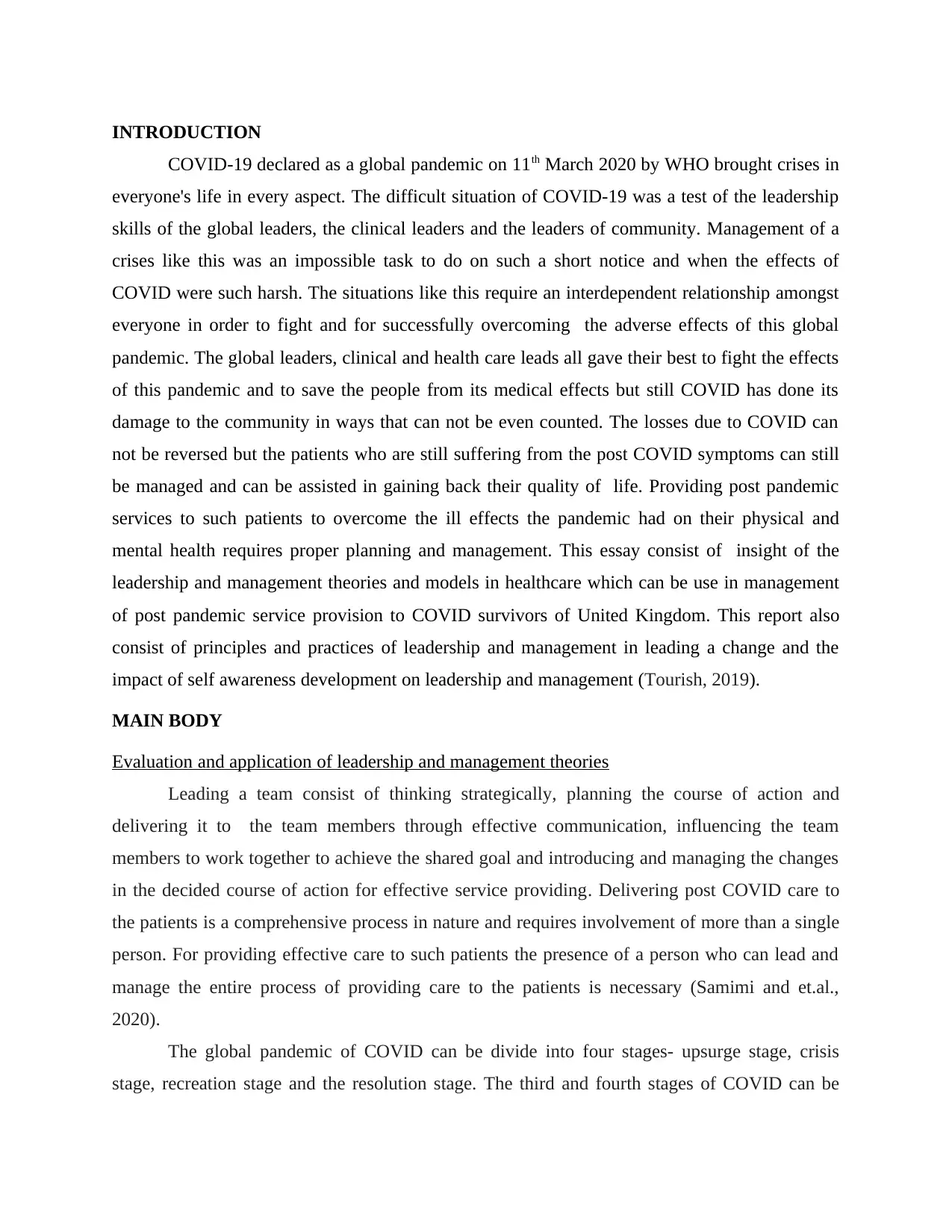
INTRODUCTION
COVID-19 declared as a global pandemic on 11th March 2020 by WHO brought crises in
everyone's life in every aspect. The difficult situation of COVID-19 was a test of the leadership
skills of the global leaders, the clinical leaders and the leaders of community. Management of a
crises like this was an impossible task to do on such a short notice and when the effects of
COVID were such harsh. The situations like this require an interdependent relationship amongst
everyone in order to fight and for successfully overcoming the adverse effects of this global
pandemic. The global leaders, clinical and health care leads all gave their best to fight the effects
of this pandemic and to save the people from its medical effects but still COVID has done its
damage to the community in ways that can not be even counted. The losses due to COVID can
not be reversed but the patients who are still suffering from the post COVID symptoms can still
be managed and can be assisted in gaining back their quality of life. Providing post pandemic
services to such patients to overcome the ill effects the pandemic had on their physical and
mental health requires proper planning and management. This essay consist of insight of the
leadership and management theories and models in healthcare which can be use in management
of post pandemic service provision to COVID survivors of United Kingdom. This report also
consist of principles and practices of leadership and management in leading a change and the
impact of self awareness development on leadership and management (Tourish, 2019).
MAIN BODY
Evaluation and application of leadership and management theories
Leading a team consist of thinking strategically, planning the course of action and
delivering it to the team members through effective communication, influencing the team
members to work together to achieve the shared goal and introducing and managing the changes
in the decided course of action for effective service providing. Delivering post COVID care to
the patients is a comprehensive process in nature and requires involvement of more than a single
person. For providing effective care to such patients the presence of a person who can lead and
manage the entire process of providing care to the patients is necessary (Samimi and et.al.,
2020).
The global pandemic of COVID can be divide into four stages- upsurge stage, crisis
stage, recreation stage and the resolution stage. The third and fourth stages of COVID can be
COVID-19 declared as a global pandemic on 11th March 2020 by WHO brought crises in
everyone's life in every aspect. The difficult situation of COVID-19 was a test of the leadership
skills of the global leaders, the clinical leaders and the leaders of community. Management of a
crises like this was an impossible task to do on such a short notice and when the effects of
COVID were such harsh. The situations like this require an interdependent relationship amongst
everyone in order to fight and for successfully overcoming the adverse effects of this global
pandemic. The global leaders, clinical and health care leads all gave their best to fight the effects
of this pandemic and to save the people from its medical effects but still COVID has done its
damage to the community in ways that can not be even counted. The losses due to COVID can
not be reversed but the patients who are still suffering from the post COVID symptoms can still
be managed and can be assisted in gaining back their quality of life. Providing post pandemic
services to such patients to overcome the ill effects the pandemic had on their physical and
mental health requires proper planning and management. This essay consist of insight of the
leadership and management theories and models in healthcare which can be use in management
of post pandemic service provision to COVID survivors of United Kingdom. This report also
consist of principles and practices of leadership and management in leading a change and the
impact of self awareness development on leadership and management (Tourish, 2019).
MAIN BODY
Evaluation and application of leadership and management theories
Leading a team consist of thinking strategically, planning the course of action and
delivering it to the team members through effective communication, influencing the team
members to work together to achieve the shared goal and introducing and managing the changes
in the decided course of action for effective service providing. Delivering post COVID care to
the patients is a comprehensive process in nature and requires involvement of more than a single
person. For providing effective care to such patients the presence of a person who can lead and
manage the entire process of providing care to the patients is necessary (Samimi and et.al.,
2020).
The global pandemic of COVID can be divide into four stages- upsurge stage, crisis
stage, recreation stage and the resolution stage. The third and fourth stages of COVID can be
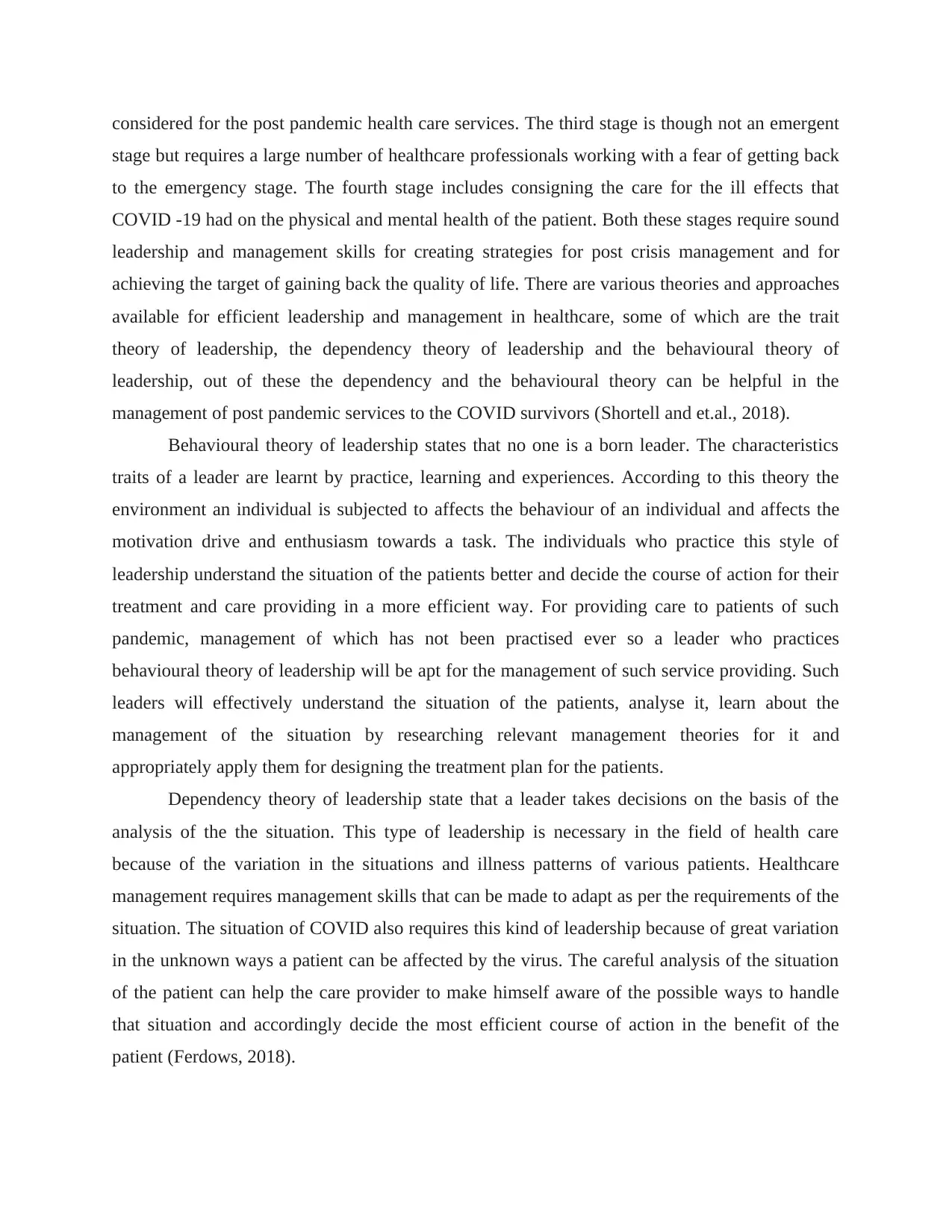
considered for the post pandemic health care services. The third stage is though not an emergent
stage but requires a large number of healthcare professionals working with a fear of getting back
to the emergency stage. The fourth stage includes consigning the care for the ill effects that
COVID -19 had on the physical and mental health of the patient. Both these stages require sound
leadership and management skills for creating strategies for post crisis management and for
achieving the target of gaining back the quality of life. There are various theories and approaches
available for efficient leadership and management in healthcare, some of which are the trait
theory of leadership, the dependency theory of leadership and the behavioural theory of
leadership, out of these the dependency and the behavioural theory can be helpful in the
management of post pandemic services to the COVID survivors (Shortell and et.al., 2018).
Behavioural theory of leadership states that no one is a born leader. The characteristics
traits of a leader are learnt by practice, learning and experiences. According to this theory the
environment an individual is subjected to affects the behaviour of an individual and affects the
motivation drive and enthusiasm towards a task. The individuals who practice this style of
leadership understand the situation of the patients better and decide the course of action for their
treatment and care providing in a more efficient way. For providing care to patients of such
pandemic, management of which has not been practised ever so a leader who practices
behavioural theory of leadership will be apt for the management of such service providing. Such
leaders will effectively understand the situation of the patients, analyse it, learn about the
management of the situation by researching relevant management theories for it and
appropriately apply them for designing the treatment plan for the patients.
Dependency theory of leadership state that a leader takes decisions on the basis of the
analysis of the the situation. This type of leadership is necessary in the field of health care
because of the variation in the situations and illness patterns of various patients. Healthcare
management requires management skills that can be made to adapt as per the requirements of the
situation. The situation of COVID also requires this kind of leadership because of great variation
in the unknown ways a patient can be affected by the virus. The careful analysis of the situation
of the patient can help the care provider to make himself aware of the possible ways to handle
that situation and accordingly decide the most efficient course of action in the benefit of the
patient (Ferdows, 2018).
stage but requires a large number of healthcare professionals working with a fear of getting back
to the emergency stage. The fourth stage includes consigning the care for the ill effects that
COVID -19 had on the physical and mental health of the patient. Both these stages require sound
leadership and management skills for creating strategies for post crisis management and for
achieving the target of gaining back the quality of life. There are various theories and approaches
available for efficient leadership and management in healthcare, some of which are the trait
theory of leadership, the dependency theory of leadership and the behavioural theory of
leadership, out of these the dependency and the behavioural theory can be helpful in the
management of post pandemic services to the COVID survivors (Shortell and et.al., 2018).
Behavioural theory of leadership states that no one is a born leader. The characteristics
traits of a leader are learnt by practice, learning and experiences. According to this theory the
environment an individual is subjected to affects the behaviour of an individual and affects the
motivation drive and enthusiasm towards a task. The individuals who practice this style of
leadership understand the situation of the patients better and decide the course of action for their
treatment and care providing in a more efficient way. For providing care to patients of such
pandemic, management of which has not been practised ever so a leader who practices
behavioural theory of leadership will be apt for the management of such service providing. Such
leaders will effectively understand the situation of the patients, analyse it, learn about the
management of the situation by researching relevant management theories for it and
appropriately apply them for designing the treatment plan for the patients.
Dependency theory of leadership state that a leader takes decisions on the basis of the
analysis of the the situation. This type of leadership is necessary in the field of health care
because of the variation in the situations and illness patterns of various patients. Healthcare
management requires management skills that can be made to adapt as per the requirements of the
situation. The situation of COVID also requires this kind of leadership because of great variation
in the unknown ways a patient can be affected by the virus. The careful analysis of the situation
of the patient can help the care provider to make himself aware of the possible ways to handle
that situation and accordingly decide the most efficient course of action in the benefit of the
patient (Ferdows, 2018).
Secure Best Marks with AI Grader
Need help grading? Try our AI Grader for instant feedback on your assignments.
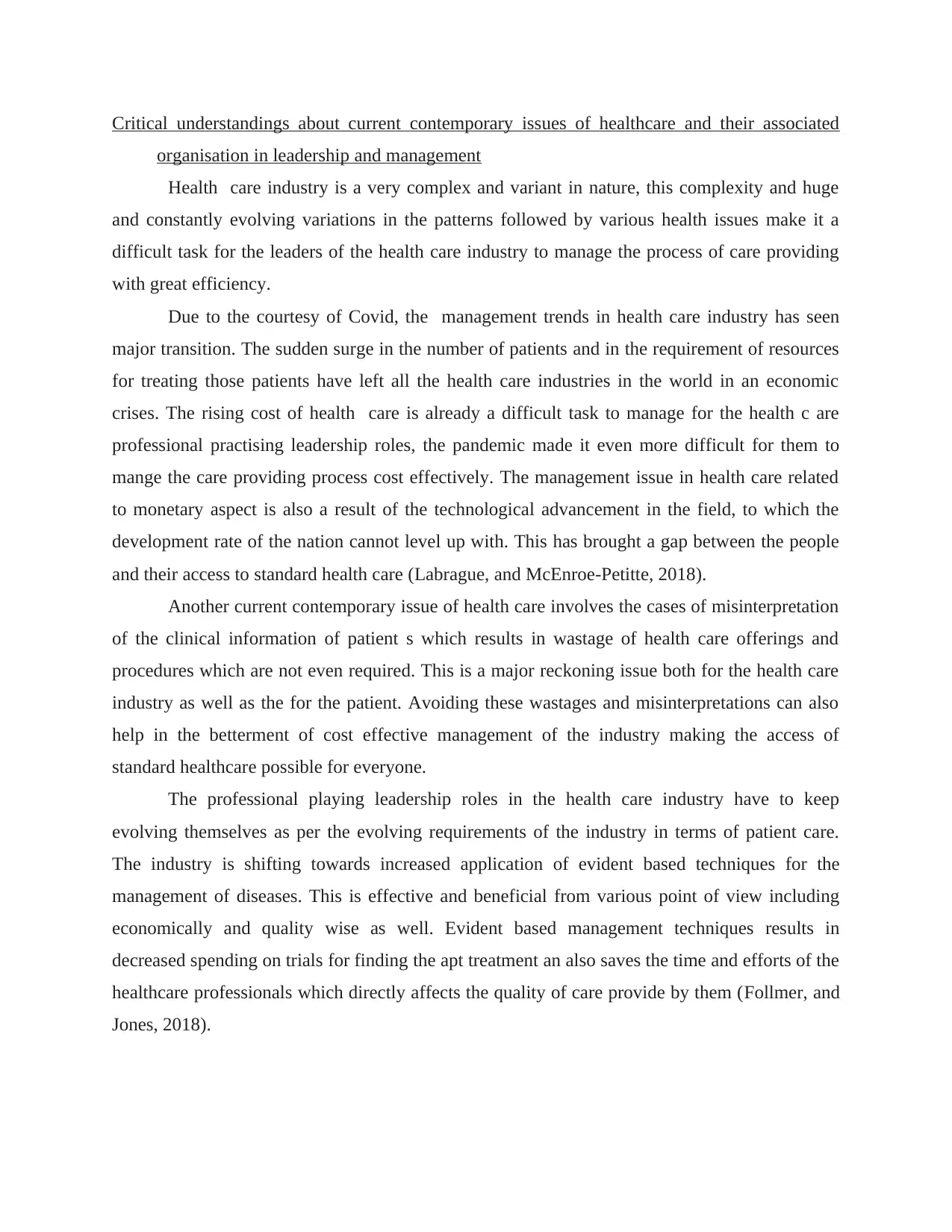
Critical understandings about current contemporary issues of healthcare and their associated
organisation in leadership and management
Health care industry is a very complex and variant in nature, this complexity and huge
and constantly evolving variations in the patterns followed by various health issues make it a
difficult task for the leaders of the health care industry to manage the process of care providing
with great efficiency.
Due to the courtesy of Covid, the management trends in health care industry has seen
major transition. The sudden surge in the number of patients and in the requirement of resources
for treating those patients have left all the health care industries in the world in an economic
crises. The rising cost of health care is already a difficult task to manage for the health c are
professional practising leadership roles, the pandemic made it even more difficult for them to
mange the care providing process cost effectively. The management issue in health care related
to monetary aspect is also a result of the technological advancement in the field, to which the
development rate of the nation cannot level up with. This has brought a gap between the people
and their access to standard health care (Labrague, and McEnroe‐Petitte, 2018).
Another current contemporary issue of health care involves the cases of misinterpretation
of the clinical information of patient s which results in wastage of health care offerings and
procedures which are not even required. This is a major reckoning issue both for the health care
industry as well as the for the patient. Avoiding these wastages and misinterpretations can also
help in the betterment of cost effective management of the industry making the access of
standard healthcare possible for everyone.
The professional playing leadership roles in the health care industry have to keep
evolving themselves as per the evolving requirements of the industry in terms of patient care.
The industry is shifting towards increased application of evident based techniques for the
management of diseases. This is effective and beneficial from various point of view including
economically and quality wise as well. Evident based management techniques results in
decreased spending on trials for finding the apt treatment an also saves the time and efforts of the
healthcare professionals which directly affects the quality of care provide by them (Follmer, and
Jones, 2018).
organisation in leadership and management
Health care industry is a very complex and variant in nature, this complexity and huge
and constantly evolving variations in the patterns followed by various health issues make it a
difficult task for the leaders of the health care industry to manage the process of care providing
with great efficiency.
Due to the courtesy of Covid, the management trends in health care industry has seen
major transition. The sudden surge in the number of patients and in the requirement of resources
for treating those patients have left all the health care industries in the world in an economic
crises. The rising cost of health care is already a difficult task to manage for the health c are
professional practising leadership roles, the pandemic made it even more difficult for them to
mange the care providing process cost effectively. The management issue in health care related
to monetary aspect is also a result of the technological advancement in the field, to which the
development rate of the nation cannot level up with. This has brought a gap between the people
and their access to standard health care (Labrague, and McEnroe‐Petitte, 2018).
Another current contemporary issue of health care involves the cases of misinterpretation
of the clinical information of patient s which results in wastage of health care offerings and
procedures which are not even required. This is a major reckoning issue both for the health care
industry as well as the for the patient. Avoiding these wastages and misinterpretations can also
help in the betterment of cost effective management of the industry making the access of
standard healthcare possible for everyone.
The professional playing leadership roles in the health care industry have to keep
evolving themselves as per the evolving requirements of the industry in terms of patient care.
The industry is shifting towards increased application of evident based techniques for the
management of diseases. This is effective and beneficial from various point of view including
economically and quality wise as well. Evident based management techniques results in
decreased spending on trials for finding the apt treatment an also saves the time and efforts of the
healthcare professionals which directly affects the quality of care provide by them (Follmer, and
Jones, 2018).
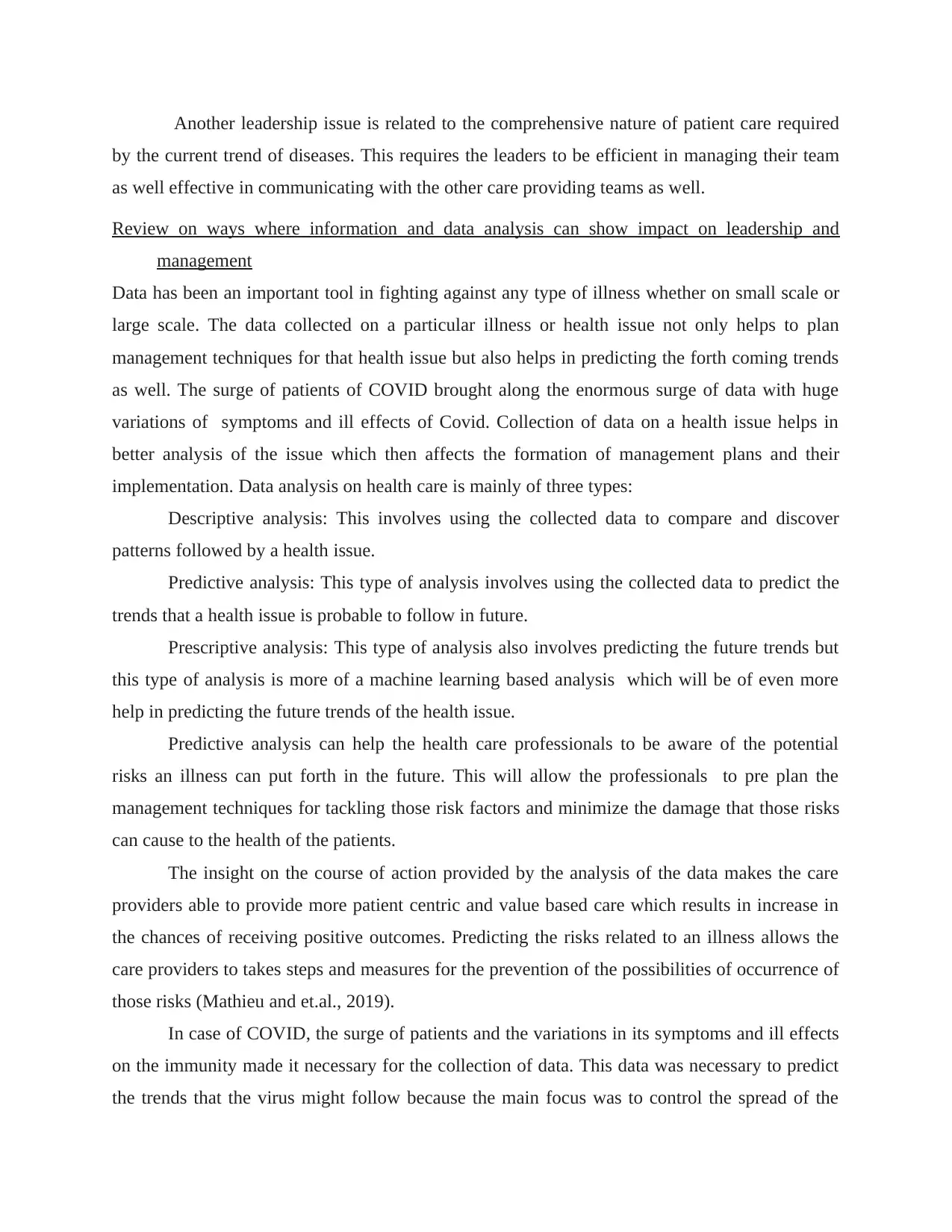
Another leadership issue is related to the comprehensive nature of patient care required
by the current trend of diseases. This requires the leaders to be efficient in managing their team
as well effective in communicating with the other care providing teams as well.
Review on ways where information and data analysis can show impact on leadership and
management
Data has been an important tool in fighting against any type of illness whether on small scale or
large scale. The data collected on a particular illness or health issue not only helps to plan
management techniques for that health issue but also helps in predicting the forth coming trends
as well. The surge of patients of COVID brought along the enormous surge of data with huge
variations of symptoms and ill effects of Covid. Collection of data on a health issue helps in
better analysis of the issue which then affects the formation of management plans and their
implementation. Data analysis on health care is mainly of three types:
Descriptive analysis: This involves using the collected data to compare and discover
patterns followed by a health issue.
Predictive analysis: This type of analysis involves using the collected data to predict the
trends that a health issue is probable to follow in future.
Prescriptive analysis: This type of analysis also involves predicting the future trends but
this type of analysis is more of a machine learning based analysis which will be of even more
help in predicting the future trends of the health issue.
Predictive analysis can help the health care professionals to be aware of the potential
risks an illness can put forth in the future. This will allow the professionals to pre plan the
management techniques for tackling those risk factors and minimize the damage that those risks
can cause to the health of the patients.
The insight on the course of action provided by the analysis of the data makes the care
providers able to provide more patient centric and value based care which results in increase in
the chances of receiving positive outcomes. Predicting the risks related to an illness allows the
care providers to takes steps and measures for the prevention of the possibilities of occurrence of
those risks (Mathieu and et.al., 2019).
In case of COVID, the surge of patients and the variations in its symptoms and ill effects
on the immunity made it necessary for the collection of data. This data was necessary to predict
the trends that the virus might follow because the main focus was to control the spread of the
by the current trend of diseases. This requires the leaders to be efficient in managing their team
as well effective in communicating with the other care providing teams as well.
Review on ways where information and data analysis can show impact on leadership and
management
Data has been an important tool in fighting against any type of illness whether on small scale or
large scale. The data collected on a particular illness or health issue not only helps to plan
management techniques for that health issue but also helps in predicting the forth coming trends
as well. The surge of patients of COVID brought along the enormous surge of data with huge
variations of symptoms and ill effects of Covid. Collection of data on a health issue helps in
better analysis of the issue which then affects the formation of management plans and their
implementation. Data analysis on health care is mainly of three types:
Descriptive analysis: This involves using the collected data to compare and discover
patterns followed by a health issue.
Predictive analysis: This type of analysis involves using the collected data to predict the
trends that a health issue is probable to follow in future.
Prescriptive analysis: This type of analysis also involves predicting the future trends but
this type of analysis is more of a machine learning based analysis which will be of even more
help in predicting the future trends of the health issue.
Predictive analysis can help the health care professionals to be aware of the potential
risks an illness can put forth in the future. This will allow the professionals to pre plan the
management techniques for tackling those risk factors and minimize the damage that those risks
can cause to the health of the patients.
The insight on the course of action provided by the analysis of the data makes the care
providers able to provide more patient centric and value based care which results in increase in
the chances of receiving positive outcomes. Predicting the risks related to an illness allows the
care providers to takes steps and measures for the prevention of the possibilities of occurrence of
those risks (Mathieu and et.al., 2019).
In case of COVID, the surge of patients and the variations in its symptoms and ill effects
on the immunity made it necessary for the collection of data. This data was necessary to predict
the trends that the virus might follow because the main focus was to control the spread of the
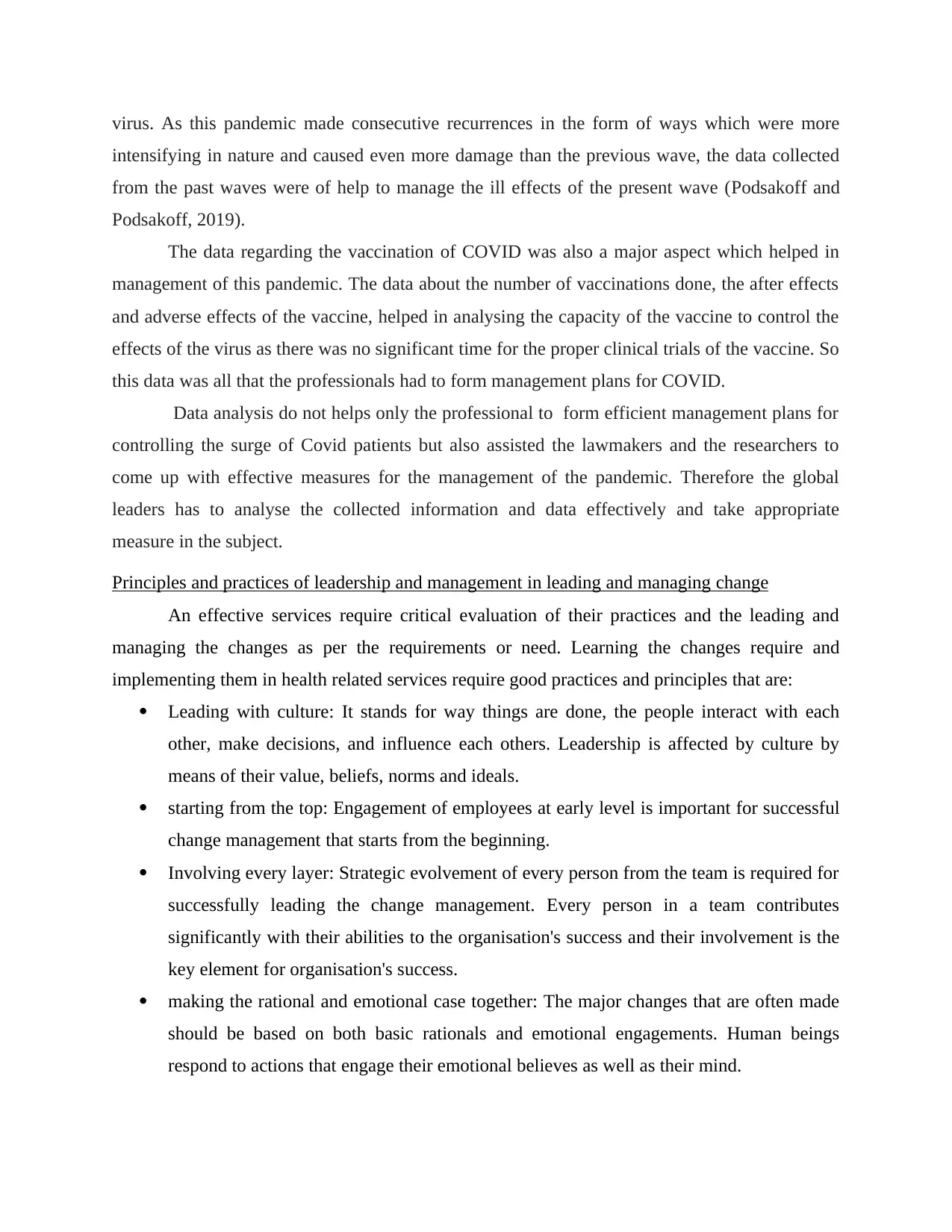
virus. As this pandemic made consecutive recurrences in the form of ways which were more
intensifying in nature and caused even more damage than the previous wave, the data collected
from the past waves were of help to manage the ill effects of the present wave (Podsakoff and
Podsakoff, 2019).
The data regarding the vaccination of COVID was also a major aspect which helped in
management of this pandemic. The data about the number of vaccinations done, the after effects
and adverse effects of the vaccine, helped in analysing the capacity of the vaccine to control the
effects of the virus as there was no significant time for the proper clinical trials of the vaccine. So
this data was all that the professionals had to form management plans for COVID.
Data analysis do not helps only the professional to form efficient management plans for
controlling the surge of Covid patients but also assisted the lawmakers and the researchers to
come up with effective measures for the management of the pandemic. Therefore the global
leaders has to analyse the collected information and data effectively and take appropriate
measure in the subject.
Principles and practices of leadership and management in leading and managing change
An effective services require critical evaluation of their practices and the leading and
managing the changes as per the requirements or need. Learning the changes require and
implementing them in health related services require good practices and principles that are:
Leading with culture: It stands for way things are done, the people interact with each
other, make decisions, and influence each others. Leadership is affected by culture by
means of their value, beliefs, norms and ideals.
starting from the top: Engagement of employees at early level is important for successful
change management that starts from the beginning.
Involving every layer: Strategic evolvement of every person from the team is required for
successfully leading the change management. Every person in a team contributes
significantly with their abilities to the organisation's success and their involvement is the
key element for organisation's success.
making the rational and emotional case together: The major changes that are often made
should be based on both basic rationals and emotional engagements. Human beings
respond to actions that engage their emotional believes as well as their mind.
intensifying in nature and caused even more damage than the previous wave, the data collected
from the past waves were of help to manage the ill effects of the present wave (Podsakoff and
Podsakoff, 2019).
The data regarding the vaccination of COVID was also a major aspect which helped in
management of this pandemic. The data about the number of vaccinations done, the after effects
and adverse effects of the vaccine, helped in analysing the capacity of the vaccine to control the
effects of the virus as there was no significant time for the proper clinical trials of the vaccine. So
this data was all that the professionals had to form management plans for COVID.
Data analysis do not helps only the professional to form efficient management plans for
controlling the surge of Covid patients but also assisted the lawmakers and the researchers to
come up with effective measures for the management of the pandemic. Therefore the global
leaders has to analyse the collected information and data effectively and take appropriate
measure in the subject.
Principles and practices of leadership and management in leading and managing change
An effective services require critical evaluation of their practices and the leading and
managing the changes as per the requirements or need. Learning the changes require and
implementing them in health related services require good practices and principles that are:
Leading with culture: It stands for way things are done, the people interact with each
other, make decisions, and influence each others. Leadership is affected by culture by
means of their value, beliefs, norms and ideals.
starting from the top: Engagement of employees at early level is important for successful
change management that starts from the beginning.
Involving every layer: Strategic evolvement of every person from the team is required for
successfully leading the change management. Every person in a team contributes
significantly with their abilities to the organisation's success and their involvement is the
key element for organisation's success.
making the rational and emotional case together: The major changes that are often made
should be based on both basic rationals and emotional engagements. Human beings
respond to actions that engage their emotional believes as well as their mind.
Paraphrase This Document
Need a fresh take? Get an instant paraphrase of this document with our AI Paraphraser
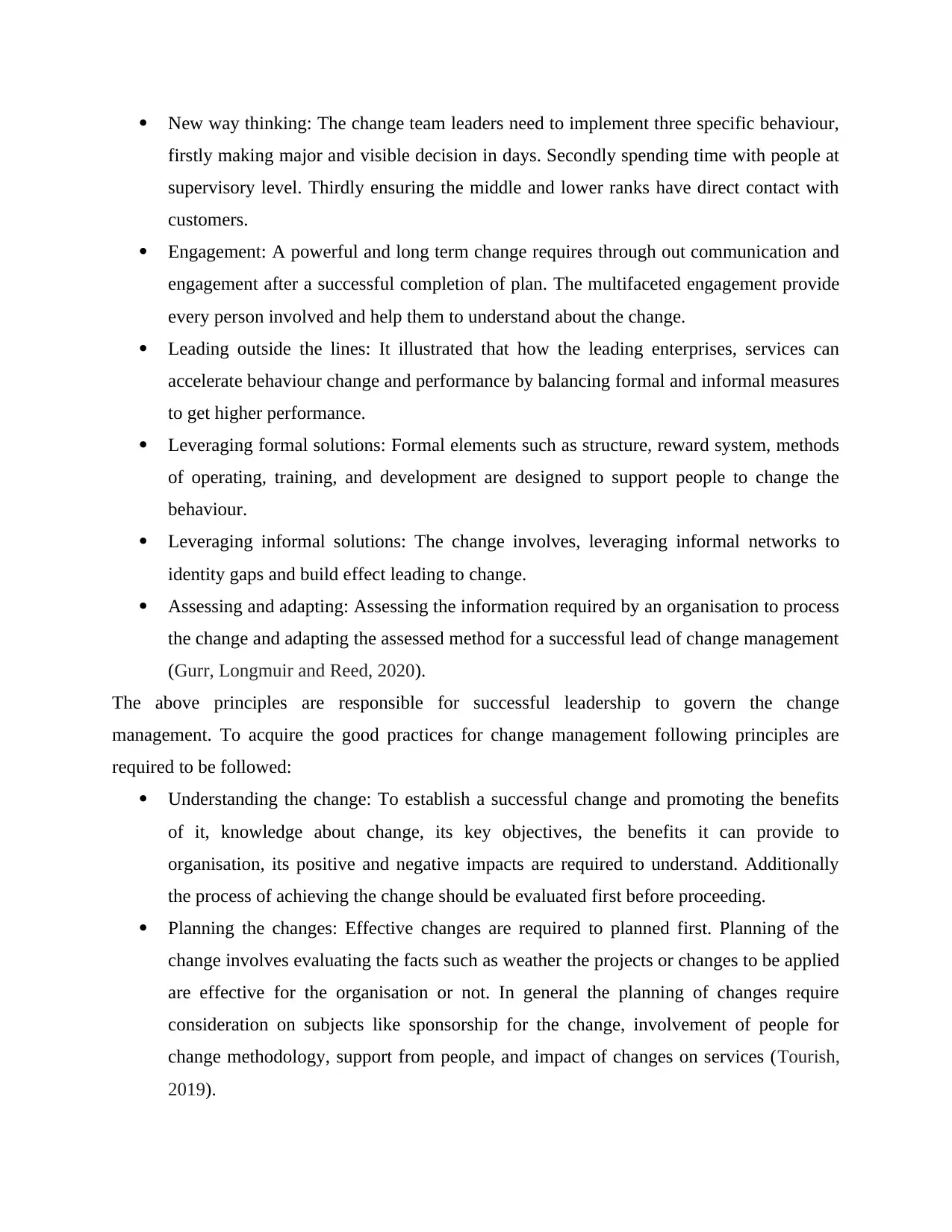
New way thinking: The change team leaders need to implement three specific behaviour,
firstly making major and visible decision in days. Secondly spending time with people at
supervisory level. Thirdly ensuring the middle and lower ranks have direct contact with
customers.
Engagement: A powerful and long term change requires through out communication and
engagement after a successful completion of plan. The multifaceted engagement provide
every person involved and help them to understand about the change.
Leading outside the lines: It illustrated that how the leading enterprises, services can
accelerate behaviour change and performance by balancing formal and informal measures
to get higher performance.
Leveraging formal solutions: Formal elements such as structure, reward system, methods
of operating, training, and development are designed to support people to change the
behaviour.
Leveraging informal solutions: The change involves, leveraging informal networks to
identity gaps and build effect leading to change.
Assessing and adapting: Assessing the information required by an organisation to process
the change and adapting the assessed method for a successful lead of change management
(Gurr, Longmuir and Reed, 2020).
The above principles are responsible for successful leadership to govern the change
management. To acquire the good practices for change management following principles are
required to be followed:
Understanding the change: To establish a successful change and promoting the benefits
of it, knowledge about change, its key objectives, the benefits it can provide to
organisation, its positive and negative impacts are required to understand. Additionally
the process of achieving the change should be evaluated first before proceeding.
Planning the changes: Effective changes are required to planned first. Planning of the
change involves evaluating the facts such as weather the projects or changes to be applied
are effective for the organisation or not. In general the planning of changes require
consideration on subjects like sponsorship for the change, involvement of people for
change methodology, support from people, and impact of changes on services (Tourish,
2019).
firstly making major and visible decision in days. Secondly spending time with people at
supervisory level. Thirdly ensuring the middle and lower ranks have direct contact with
customers.
Engagement: A powerful and long term change requires through out communication and
engagement after a successful completion of plan. The multifaceted engagement provide
every person involved and help them to understand about the change.
Leading outside the lines: It illustrated that how the leading enterprises, services can
accelerate behaviour change and performance by balancing formal and informal measures
to get higher performance.
Leveraging formal solutions: Formal elements such as structure, reward system, methods
of operating, training, and development are designed to support people to change the
behaviour.
Leveraging informal solutions: The change involves, leveraging informal networks to
identity gaps and build effect leading to change.
Assessing and adapting: Assessing the information required by an organisation to process
the change and adapting the assessed method for a successful lead of change management
(Gurr, Longmuir and Reed, 2020).
The above principles are responsible for successful leadership to govern the change
management. To acquire the good practices for change management following principles are
required to be followed:
Understanding the change: To establish a successful change and promoting the benefits
of it, knowledge about change, its key objectives, the benefits it can provide to
organisation, its positive and negative impacts are required to understand. Additionally
the process of achieving the change should be evaluated first before proceeding.
Planning the changes: Effective changes are required to planned first. Planning of the
change involves evaluating the facts such as weather the projects or changes to be applied
are effective for the organisation or not. In general the planning of changes require
consideration on subjects like sponsorship for the change, involvement of people for
change methodology, support from people, and impact of changes on services (Tourish,
2019).
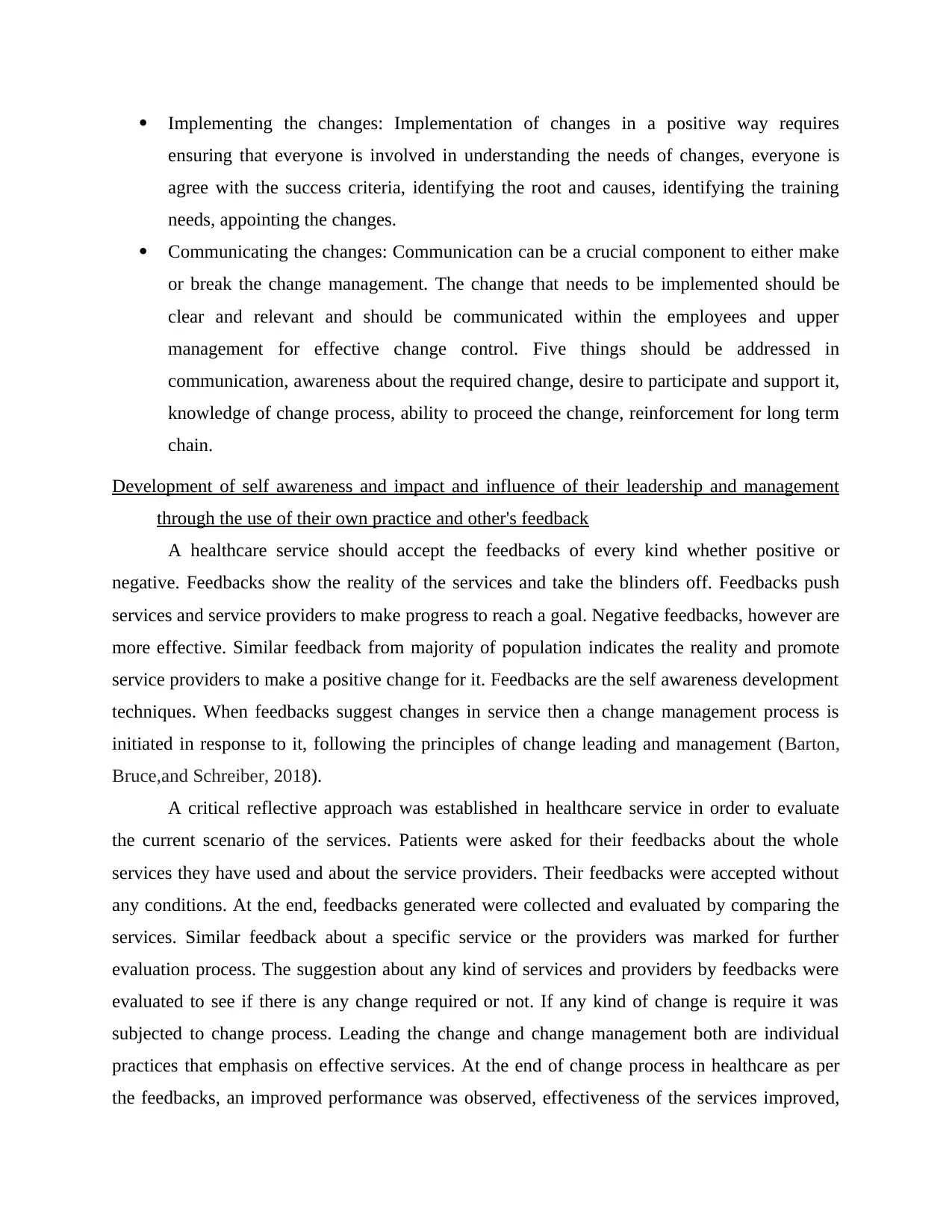
Implementing the changes: Implementation of changes in a positive way requires
ensuring that everyone is involved in understanding the needs of changes, everyone is
agree with the success criteria, identifying the root and causes, identifying the training
needs, appointing the changes.
Communicating the changes: Communication can be a crucial component to either make
or break the change management. The change that needs to be implemented should be
clear and relevant and should be communicated within the employees and upper
management for effective change control. Five things should be addressed in
communication, awareness about the required change, desire to participate and support it,
knowledge of change process, ability to proceed the change, reinforcement for long term
chain.
Development of self awareness and impact and influence of their leadership and management
through the use of their own practice and other's feedback
A healthcare service should accept the feedbacks of every kind whether positive or
negative. Feedbacks show the reality of the services and take the blinders off. Feedbacks push
services and service providers to make progress to reach a goal. Negative feedbacks, however are
more effective. Similar feedback from majority of population indicates the reality and promote
service providers to make a positive change for it. Feedbacks are the self awareness development
techniques. When feedbacks suggest changes in service then a change management process is
initiated in response to it, following the principles of change leading and management (Barton,
Bruce,and Schreiber, 2018).
A critical reflective approach was established in healthcare service in order to evaluate
the current scenario of the services. Patients were asked for their feedbacks about the whole
services they have used and about the service providers. Their feedbacks were accepted without
any conditions. At the end, feedbacks generated were collected and evaluated by comparing the
services. Similar feedback about a specific service or the providers was marked for further
evaluation process. The suggestion about any kind of services and providers by feedbacks were
evaluated to see if there is any change required or not. If any kind of change is require it was
subjected to change process. Leading the change and change management both are individual
practices that emphasis on effective services. At the end of change process in healthcare as per
the feedbacks, an improved performance was observed, effectiveness of the services improved,
ensuring that everyone is involved in understanding the needs of changes, everyone is
agree with the success criteria, identifying the root and causes, identifying the training
needs, appointing the changes.
Communicating the changes: Communication can be a crucial component to either make
or break the change management. The change that needs to be implemented should be
clear and relevant and should be communicated within the employees and upper
management for effective change control. Five things should be addressed in
communication, awareness about the required change, desire to participate and support it,
knowledge of change process, ability to proceed the change, reinforcement for long term
chain.
Development of self awareness and impact and influence of their leadership and management
through the use of their own practice and other's feedback
A healthcare service should accept the feedbacks of every kind whether positive or
negative. Feedbacks show the reality of the services and take the blinders off. Feedbacks push
services and service providers to make progress to reach a goal. Negative feedbacks, however are
more effective. Similar feedback from majority of population indicates the reality and promote
service providers to make a positive change for it. Feedbacks are the self awareness development
techniques. When feedbacks suggest changes in service then a change management process is
initiated in response to it, following the principles of change leading and management (Barton,
Bruce,and Schreiber, 2018).
A critical reflective approach was established in healthcare service in order to evaluate
the current scenario of the services. Patients were asked for their feedbacks about the whole
services they have used and about the service providers. Their feedbacks were accepted without
any conditions. At the end, feedbacks generated were collected and evaluated by comparing the
services. Similar feedback about a specific service or the providers was marked for further
evaluation process. The suggestion about any kind of services and providers by feedbacks were
evaluated to see if there is any change required or not. If any kind of change is require it was
subjected to change process. Leading the change and change management both are individual
practices that emphasis on effective services. At the end of change process in healthcare as per
the feedbacks, an improved performance was observed, effectiveness of the services improved,
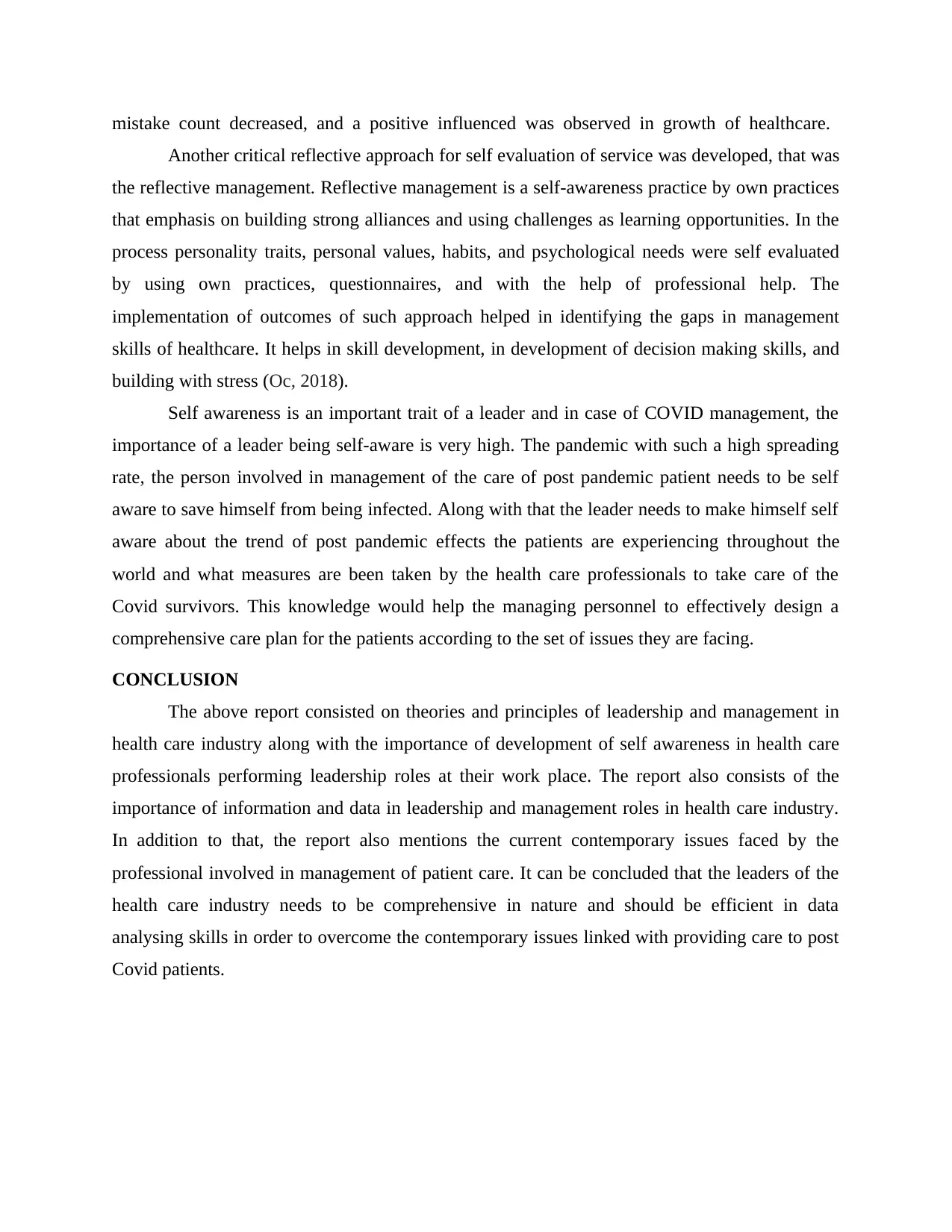
mistake count decreased, and a positive influenced was observed in growth of healthcare.
Another critical reflective approach for self evaluation of service was developed, that was
the reflective management. Reflective management is a self-awareness practice by own practices
that emphasis on building strong alliances and using challenges as learning opportunities. In the
process personality traits, personal values, habits, and psychological needs were self evaluated
by using own practices, questionnaires, and with the help of professional help. The
implementation of outcomes of such approach helped in identifying the gaps in management
skills of healthcare. It helps in skill development, in development of decision making skills, and
building with stress (Oc, 2018).
Self awareness is an important trait of a leader and in case of COVID management, the
importance of a leader being self-aware is very high. The pandemic with such a high spreading
rate, the person involved in management of the care of post pandemic patient needs to be self
aware to save himself from being infected. Along with that the leader needs to make himself self
aware about the trend of post pandemic effects the patients are experiencing throughout the
world and what measures are been taken by the health care professionals to take care of the
Covid survivors. This knowledge would help the managing personnel to effectively design a
comprehensive care plan for the patients according to the set of issues they are facing.
CONCLUSION
The above report consisted on theories and principles of leadership and management in
health care industry along with the importance of development of self awareness in health care
professionals performing leadership roles at their work place. The report also consists of the
importance of information and data in leadership and management roles in health care industry.
In addition to that, the report also mentions the current contemporary issues faced by the
professional involved in management of patient care. It can be concluded that the leaders of the
health care industry needs to be comprehensive in nature and should be efficient in data
analysing skills in order to overcome the contemporary issues linked with providing care to post
Covid patients.
Another critical reflective approach for self evaluation of service was developed, that was
the reflective management. Reflective management is a self-awareness practice by own practices
that emphasis on building strong alliances and using challenges as learning opportunities. In the
process personality traits, personal values, habits, and psychological needs were self evaluated
by using own practices, questionnaires, and with the help of professional help. The
implementation of outcomes of such approach helped in identifying the gaps in management
skills of healthcare. It helps in skill development, in development of decision making skills, and
building with stress (Oc, 2018).
Self awareness is an important trait of a leader and in case of COVID management, the
importance of a leader being self-aware is very high. The pandemic with such a high spreading
rate, the person involved in management of the care of post pandemic patient needs to be self
aware to save himself from being infected. Along with that the leader needs to make himself self
aware about the trend of post pandemic effects the patients are experiencing throughout the
world and what measures are been taken by the health care professionals to take care of the
Covid survivors. This knowledge would help the managing personnel to effectively design a
comprehensive care plan for the patients according to the set of issues they are facing.
CONCLUSION
The above report consisted on theories and principles of leadership and management in
health care industry along with the importance of development of self awareness in health care
professionals performing leadership roles at their work place. The report also consists of the
importance of information and data in leadership and management roles in health care industry.
In addition to that, the report also mentions the current contemporary issues faced by the
professional involved in management of patient care. It can be concluded that the leaders of the
health care industry needs to be comprehensive in nature and should be efficient in data
analysing skills in order to overcome the contemporary issues linked with providing care to post
Covid patients.
Secure Best Marks with AI Grader
Need help grading? Try our AI Grader for instant feedback on your assignments.
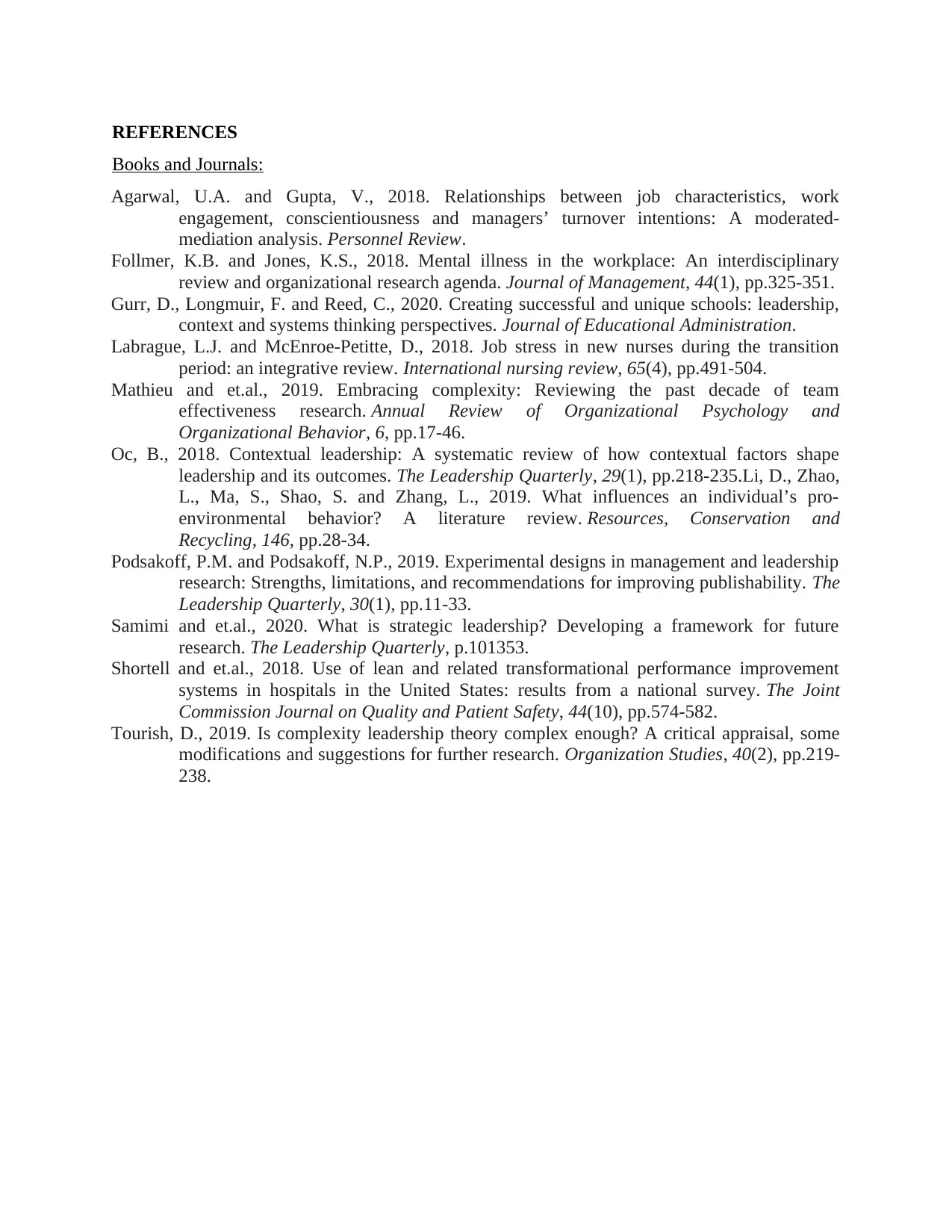
REFERENCES
Books and Journals:
Agarwal, U.A. and Gupta, V., 2018. Relationships between job characteristics, work
engagement, conscientiousness and managers’ turnover intentions: A moderated-
mediation analysis. Personnel Review.
Follmer, K.B. and Jones, K.S., 2018. Mental illness in the workplace: An interdisciplinary
review and organizational research agenda. Journal of Management, 44(1), pp.325-351.
Gurr, D., Longmuir, F. and Reed, C., 2020. Creating successful and unique schools: leadership,
context and systems thinking perspectives. Journal of Educational Administration.
Labrague, L.J. and McEnroe‐Petitte, D., 2018. Job stress in new nurses during the transition
period: an integrative review. International nursing review, 65(4), pp.491-504.
Mathieu and et.al., 2019. Embracing complexity: Reviewing the past decade of team
effectiveness research. Annual Review of Organizational Psychology and
Organizational Behavior, 6, pp.17-46.
Oc, B., 2018. Contextual leadership: A systematic review of how contextual factors shape
leadership and its outcomes. The Leadership Quarterly, 29(1), pp.218-235.Li, D., Zhao,
L., Ma, S., Shao, S. and Zhang, L., 2019. What influences an individual’s pro-
environmental behavior? A literature review. Resources, Conservation and
Recycling, 146, pp.28-34.
Podsakoff, P.M. and Podsakoff, N.P., 2019. Experimental designs in management and leadership
research: Strengths, limitations, and recommendations for improving publishability. The
Leadership Quarterly, 30(1), pp.11-33.
Samimi and et.al., 2020. What is strategic leadership? Developing a framework for future
research. The Leadership Quarterly, p.101353.
Shortell and et.al., 2018. Use of lean and related transformational performance improvement
systems in hospitals in the United States: results from a national survey. The Joint
Commission Journal on Quality and Patient Safety, 44(10), pp.574-582.
Tourish, D., 2019. Is complexity leadership theory complex enough? A critical appraisal, some
modifications and suggestions for further research. Organization Studies, 40(2), pp.219-
238.
Books and Journals:
Agarwal, U.A. and Gupta, V., 2018. Relationships between job characteristics, work
engagement, conscientiousness and managers’ turnover intentions: A moderated-
mediation analysis. Personnel Review.
Follmer, K.B. and Jones, K.S., 2018. Mental illness in the workplace: An interdisciplinary
review and organizational research agenda. Journal of Management, 44(1), pp.325-351.
Gurr, D., Longmuir, F. and Reed, C., 2020. Creating successful and unique schools: leadership,
context and systems thinking perspectives. Journal of Educational Administration.
Labrague, L.J. and McEnroe‐Petitte, D., 2018. Job stress in new nurses during the transition
period: an integrative review. International nursing review, 65(4), pp.491-504.
Mathieu and et.al., 2019. Embracing complexity: Reviewing the past decade of team
effectiveness research. Annual Review of Organizational Psychology and
Organizational Behavior, 6, pp.17-46.
Oc, B., 2018. Contextual leadership: A systematic review of how contextual factors shape
leadership and its outcomes. The Leadership Quarterly, 29(1), pp.218-235.Li, D., Zhao,
L., Ma, S., Shao, S. and Zhang, L., 2019. What influences an individual’s pro-
environmental behavior? A literature review. Resources, Conservation and
Recycling, 146, pp.28-34.
Podsakoff, P.M. and Podsakoff, N.P., 2019. Experimental designs in management and leadership
research: Strengths, limitations, and recommendations for improving publishability. The
Leadership Quarterly, 30(1), pp.11-33.
Samimi and et.al., 2020. What is strategic leadership? Developing a framework for future
research. The Leadership Quarterly, p.101353.
Shortell and et.al., 2018. Use of lean and related transformational performance improvement
systems in hospitals in the United States: results from a national survey. The Joint
Commission Journal on Quality and Patient Safety, 44(10), pp.574-582.
Tourish, D., 2019. Is complexity leadership theory complex enough? A critical appraisal, some
modifications and suggestions for further research. Organization Studies, 40(2), pp.219-
238.
1 out of 11
Related Documents
Your All-in-One AI-Powered Toolkit for Academic Success.
+13062052269
info@desklib.com
Available 24*7 on WhatsApp / Email
![[object Object]](/_next/static/media/star-bottom.7253800d.svg)
Unlock your academic potential
© 2024 | Zucol Services PVT LTD | All rights reserved.





